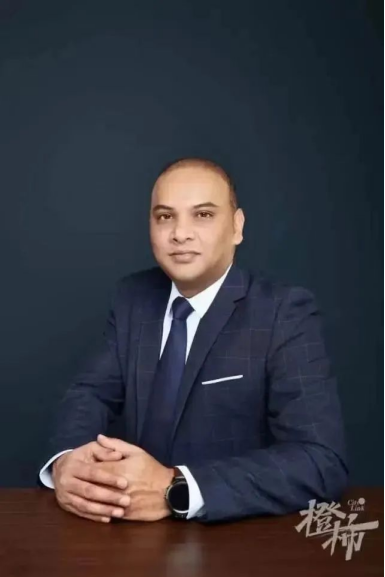
The First Hospital of Zhejiang University School of Medicine (ZJU-IH) on Qingchun Road has a hepatobiliary and pancreatic surgery department with hepatopancreatic transplantation that is a gold standard nationwide. Did you know? Currently working in such an important field is a schoolboy from Nepal.
His full name is Dipesh Kumar Yadav, and his friends have given him the Chinese name Lin Shan. At 37 years old, Lin Shan is quite tall with a sturdy build. He has a muscular body and wears an inch cut and a duck cap. At first glance, does he look like a fitness instructor?
The uncompromising academic
Lin Shan first came to China 18 years ago; he studied at the First Shandong Medical University as an undergraduate in 2004, then at Ningbo University in 2011, where he spent three years studying for a master's degree in general surgery (hepatobiliary and pancreatic surgery) before coming to Zhejiang University School of Medicine in 2016 to study for a doctorate in hepatobiliary and pancreatic surgery.
He is a very bright student who studies hard, respects his teachers, unites with his classmates, is outgoing, sincere and helpful, and actively participates in various activities organized by the university. He speaks Chinese very well, likes to communicate with others , and asks questions whenever he doesn't understand something, he is well liked and respected among his classmates.
After graduating, Lin Shan worked hard to obtain his medical certificate in Nepal and continued his studies to obtain a master's degree and a doctorate.
In 2019, Lin Shan, who graduated with a PhD, was selected for the "Postdoctoral International Exchange Programme" in China and became a postdoctoral student in hepatopancreatic transplantation in the Department of Hepatobiliary and Pancreatic Surgery of Zhejiang University. It is not easy to be selected for this programme, as there are only 300 places in so many universities in China, and Lin Shan is the only international student from Zhejiang University to be selected.
Lin Shan is a true academic. He has published 27 papers in top international journals and has edited and published a book in the field of liver transplantation. Dr. Ling Qi, chief physician of hepatobiliary and pancreatic surgery at ZJU's First Hospital, PhD supervisor and vice dean of Zhejiang University's School of Pharmacy, laughs: "When Lin Shan goes to the research office of ZJU to register his academic achievements, his colleagues look at him like an alien. Because the number of his papers is almost as much as 3-5 PhD students."
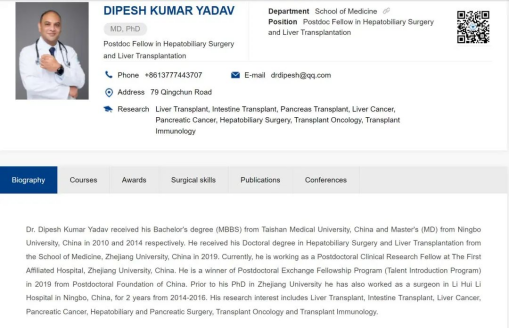
In response, Lin Shan said modestly that he is just an ordinary student who likes to work to the fullest.
No matter what day or holiday it is, Lin Shan is always sitting in front of the computer at home in Hangzhou on weekends, often with a cup of coffee and a laptop to keep him company, working continuously for 15 or 16 hours. Lin Shan's wife once posted a message on social media saying, "No matter what day or holiday it is, Lin Shan is always sitting in front of the computer."
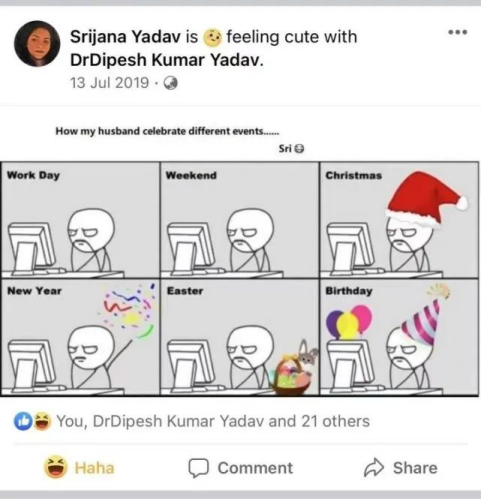
On a normal working day, Lin Shan wakes up at 5:30am and arrives at the department by 7:30pm to start the day's work. During the day, he spends more time in the operating theatre, with the longest liver transplant lasting 16 hours. Two or three operations a day are the norm, and when they are finished it is often nightfall and his work is still far from over.
Once a week, Lin Shan has to work the night shift. Even if he is not on night duty, he still has to go home to study the literature and write papers. He usually studies until 11pm and then video chats with his wife and 1-year-old daughter in Nepal for half an hour (there is a 2-hour time difference between China and Nepal). This gives him around 6 hours of sleep a day.
Lin Shan drinks between 5 and 10 cups of coffee a day. He says that drinking more coffee doesn't affect his sleep, and that at the end of the day, he falls asleep. He laughs when talking about coffee and says that on one of his and his wife's anniversaries, he gave himself flowers and his wife joked on social media, "I know that you love me more than your coffee and computer."
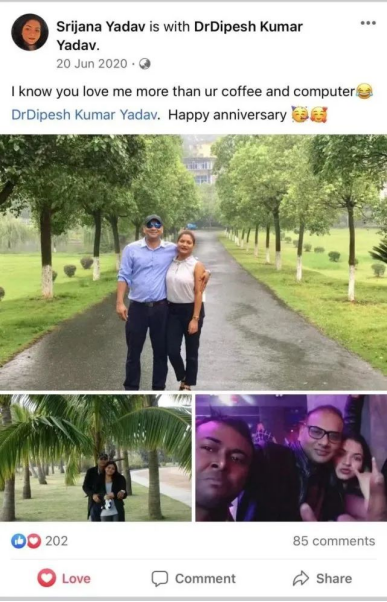
Doing the work you love
Live the life you love
When it comes to his work, Lin Shan is very eloquent, and when he gets excited, he speeds up his speech and dances around. You can sense that he is a very internally driven person, and when you ask him where his motivation comes from, he frowns for a moment and says, "It comes from liking it!"
Lin Shan says he doesn't know what it is, no one in his family is a doctor, his father is a university business professor, but from a young age he aspired to be a surgeon and never wanted to pursue any other career. As a child, he loved to write the names of all the common medicines on paper and had a first aid kit at his side, fiddling with the various things in it.
Lin Shan enjoys his current job, but is often frustrated: "Because I want to learn more literature, read more specialist books and get more results. Maybe I'm greedy, but also because there are so many good colleagues around me, and I'm nothing compared to them. I get anxious about this and push myself to try harder. I will strive for excellence in my work, not missing any details, and don't want to leave the opportunity for others to criticise me." Ling Qi, a mentor at the First Hospital of Zhejiang University, also commented that Lin Shan is exceptionally hardworking and studious, and that foreign doctors like him working in frontline positions in Chinese hospitals can be a rarity.
Abdul Kalam, former President of India and known as the "father of India's missiles", said, "Dreams are not what you see in your sleep, but what drives you to work tirelessly to keep you awake." This quote has become Lin Shan's motto. He says he "wants to run, is not afraid of falling, and if he falls, he gets up and runs again, never wanting to stop where he is".
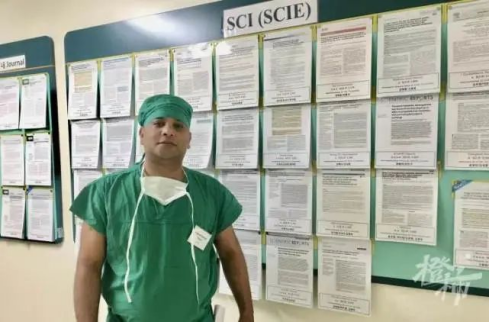
Outside of work, Lin Shan loves to sing. He won second prize in a school singing competition in his junior year, and sang on stage during his university years. Outside of his high-intensity and high-stress job, he would ask people to sing with him on social media in Nepal, mostly his classmates and friends. He would always record videos of the chorus to watch and listen to during his breaks. "It's quite stress-relieving!" He says.
Lin Shan studied in China for 18 years, with Shandong First Medical University being his first stop in China. After his undergraduate degree, he briefly returned to China to work as a medical officer at a local hospital; he also worked as a surgeon at Ningbo Medical Centre Li Huili Hospital for two years after his master's degree at Ningbo University. Now that he is about to graduate from his post-doctorate, Lin Shan is also starting to plan his future. He says he wants to work as a surgeon in a large Chinese hospital first, or conduct research and become a university professor.
Lin Shan dreams of one day returning to China to open a large general hospital. "Nepal is a small country, hospitals are generally not invested in and the infrastructure is rather rudimentary." He hopes to return home after his studies, spread the voice of China, tell the Chinese story and help more Nepali patients. (Source: Zhejiang Medical University)